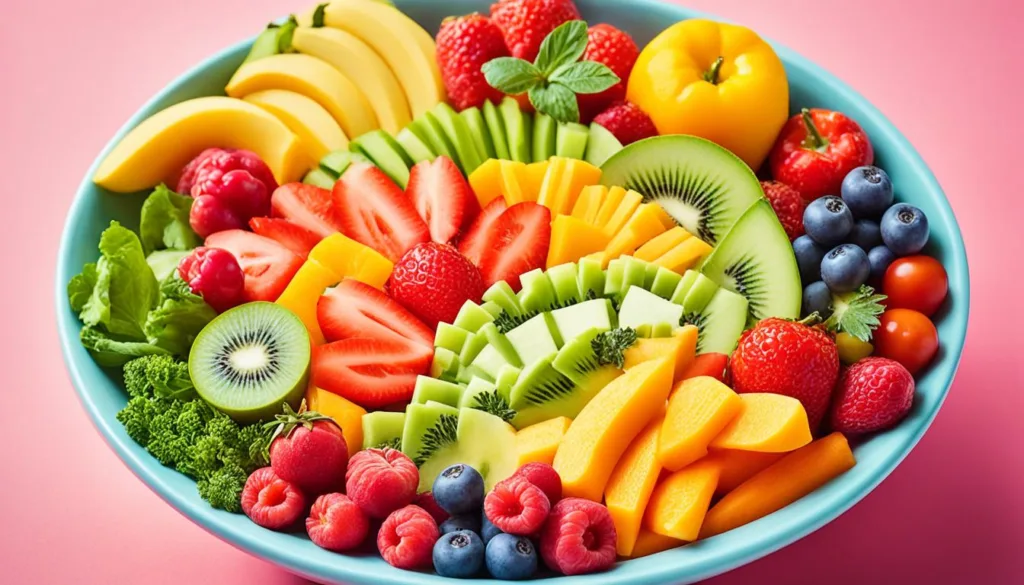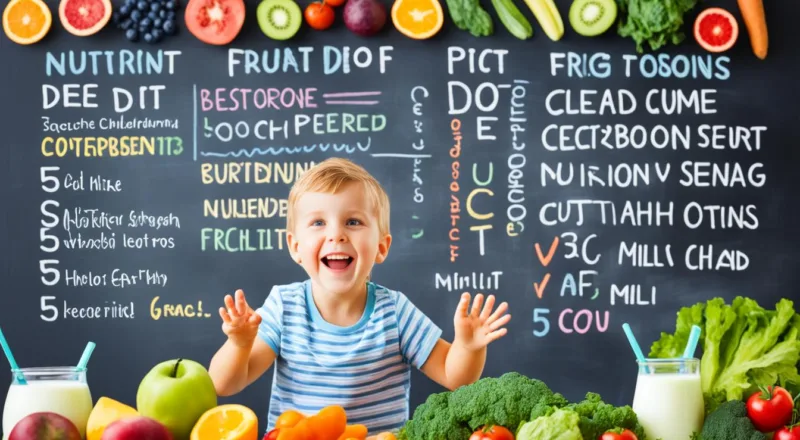Benefits of Healthy Food for Kids: 5 Surprising Benefits of Nutrient-Rich Diets
“Unlock the secret benefits of healthy food for kids! Discover 5 surprising advantages in our nutrient-rich diet guide. Nurture their growth and potential with every bite. Your child’s brighter future starts here!”
Introduction to the Benefits of Healthy Food for Kids
Ever wondered how a simple shift in a child’s diet could be the key to unlocking their full potential? What if I told you that beyond the obvious health benefits, nutrient-rich diets for kids come with 5 surprising benefits that could shape their future in remarkable ways? In this exploration of the ‘Benefits of Healthy Food for Kids: 5 Surprising Benefits of Nutrient-Rich Diets,’ we delve into a world where every meal has the power to nurture not just their bodies, but their minds and potential.
Key Takeaways:
- 1. Nutrient-rich diets for kids offer more than just physical health benefits.
- 2. Healthy eating habits can positively impact a child’s growth and development.
- 3. Nutrient-dense foods support cognitive development and academic performance.
- 4. A healthy diet can enhance a child’s emotional well-being.
- 5. Nutrient-rich foods help strengthen a child’s immune system.
Understanding Child Nutrition and Its Lifelong Impact
Child nutrition plays a critical role in their overall growth, development, and long-term health. By providing nutrient-rich foods, parents can promote child growth and prevent various health issues. A balanced and healthy diet has the power to positively influence a child’s cognitive development, learning abilities, and emotional well-being.
The Role of Nutrient-Dense Foods in Promoting Child Growth
Nutrient-dense foods are packed with essential vitamins, minerals, and antioxidants that are crucial for optimal child growth. These foods provide the building blocks for healthy bones, muscles, organs, and tissues. By incorporating a variety of fruits, vegetables, whole grains, lean proteins, and dairy products into a child’s diet, parents can provide the necessary nutrients for their growth and development.
Preventing Health Issues Through Balanced Meals for Children
A balanced diet plays a vital role in preventing health issues in children. By offering a variety of nutrient-rich foods, parents can reduce the risk of obesity, heart disease, and nutrient deficiencies. A diet rich in fruits, vegetables, whole grains, and lean proteins provides essential vitamins, minerals, and antioxidants that support a child’s overall health and well-being.
Mental Health: How a Healthy Diet Influences Cognitive Development
A healthy diet has a profound impact on a child’s mental health and cognitive development. Nutrient-rich foods, such as omega-3 fatty acids found in fish, help support brain development and improve cognitive function. Adequate intake of vitamins and minerals, like iron and folate, is essential for memory, concentration, and overall learning abilities. By providing a well-balanced diet, parents can support their child’s cognitive development and lay the foundation for academic success.
Table showing the Benefits of Healthy Food for Kids
| Benefits of Child Nutrition | Promoting Child Growth | Preventing Health Issues | Influencing Cognitive Development |
|---|---|---|---|
| Provides essential vitamins, minerals, and antioxidants | Supports healthy bone, muscle, and organ development | Reduces the risk of obesity, heart disease, and nutrient deficiencies | Improves brain function, memory, and concentration |
| Enhances overall health and well-being | Helps children reach their full growth potential | Promotes a healthy weight and immune system | Lays the foundation for academic success |
Understand the Benefits of Healthy food for Kids!
By understanding the importance of child nutrition and the lifelong impact it can have, parents can make informed choices to provide their children with balanced and nutritious meals. Ensuring a healthy diet not only supports physical growth but also contributes to cognitive development and emotional well-being, setting the stage for a lifetime of health and success.
Nutrition’s Effect on Academic Performance and Behavior
Nutrition plays a crucial role in a child’s academic performance and behavior. A healthy diet rich in essential nutrients, such as omega-3 fatty acids, vitamins, and minerals, supports brain development, cognitive function, and memory. It also helps regulate mood, attention, and behavior.
Research has shown that children who consume nutritious meals have improved cognitive abilities, including better concentration, problem-solving skills, and information retention. By providing well-balanced meals that include a variety of nutrient-dense foods, parents can optimize their child’s academic performance and set them up for success in school and beyond.
The Benefits of Healthy food for Kids during their School Life
Furthermore, a healthy diet has a positive impact on behavior and emotional well-being. Nutrient-rich foods provide the necessary fuel for proper brain function and help balance neurotransmitters, which play a role in regulating mood and behavior. By nourishing their child’s brain with nutritious meals, parents can promote positive behavior, reduce the risk of behavioral issues, and support their child’s overall emotional well-being.
Incorporating a variety of nutrient-packed foods into a child’s diet is essential for optimizing their academic performance and behavior.
Health Benefits of Healthy Food for Kids: Must Need Nutrient Dence Food
Some examples of nutrient-rich foods include:
- Fatty fish, such as salmon, which is rich in omega-3 fatty acids.
- Leafy green vegetables, like spinach and kale, which are high in vitamins and minerals.
- Fruits, such as berries and oranges, which are packed with antioxidants.
- Whole grains, like quinoa and brown rice, which provide a steady release of energy.
- Lean proteins, such as chicken and beans, which support muscle and brain development.
By ensuring children have a well-rounded, nutritious diet, parents can positively impact their academic performance and behavior, setting them up for a successful future.
Strategies for Encouraging Kids to Embrace Healthy Eating
Encouraging kids to embrace healthy eating can sometimes be a challenge. However, as parents, we have the power to influence our children’s food choices and create an environment that promotes nutritious eating habits. In this section, we will explore three effective strategies that can help us accomplish this goal: leading by example, involving children in meal prep, and offering clever healthy snack ideas.
Leading by Example: The Power of Parental Influence
As parents, we are the primary role models for our children. By demonstrating healthy eating habits ourselves, we can inspire our kids to follow suit. When children see us enjoying nutritious meals and snacks, they are more likely to develop a positive attitude towards healthy food. Sharing our own experiences and the benefits we gain from eating well can further motivate them to make healthier choices.
Kitchen Adventures: Involving Children in Meal Prep
Another powerful strategy for encouraging kids to embrace healthy eating is to involve them in meal preparation. Making cooking and meal prep a fun and educational activity creates a positive association with food and empowers children to take an active role in their own nutrition. When kids are involved in planning and preparing meals, they become more invested in the process and are more likely to try new foods and flavors.
Clever Healthy Snack Ideas to Satisfy Young Cravings
Snacks are an essential part of a child’s diet, and with a little creativity, we can make them both nutritious and delicious. By offering clever and creative healthy snack ideas, we can satisfy our kids’ cravings while still ensuring they receive the nutrients they need. Incorporating fruits, vegetables, whole grains, and protein-rich foods into snack time can provide a balanced and satisfying experience for our little ones.
Here are a few examples of clever healthy snack ideas to get Most Benefits of Healthy food for Kids!
- Ants on a log: Celery sticks topped with peanut butter or almond butter and raisins.
- Fruit kebabs: Skewer pieces of colorful fruits like berries, melon, mango and pineapple
- Veggie chips: Bake thinly sliced vegetables like zucchini, sweet potato, and kale for a crispy snack.
- Yogurt parfaits: Layer low-fat yogurt with granola and fresh berries
- Homemade trail mix: Combine a mix of nuts, seeds, dried fruits, and whole-grain cereal.
Benefits of Healthy Food for Kids and Importance of Involving Kids in Kitchen
By implementing these strategies, we can empower our children to embrace healthy eating habits that will benefit them for a lifetime. Let’s lead by example, involve them in the kitchen, and provide them with clever and creative healthy snack options. Together, we can create a nourishing environment that supports their well-being and sets them up for a future filled with good health.
The Surprising Connection Between Diet and Emotional Well-being
Ever wondered how a simple shift in your child’s diet could be the key to unlocking their full potential? What if we told you that beyond the obvious health benefits, nutrient-rich diets for kids come with 5 surprising benefits that could shape their future in remarkable ways? In this exploration of the ‘Benefits of Healthy Food for Kids: 5 Surprising Benefits of Nutrient-Rich Diets,’ we delve into a world where every meal has the power to nurture not just their bodies, but their minds and potential.
Benefits of Healthy food for Kids: Connection Between Diet and Emotional wellbeing
Research has shown that a healthy diet can have a positive impact on a child’s mental health, reducing the risk of conditions such as depression, anxiety, and ADHD. Nutrient-rich foods, rich in antioxidants and essential nutrients, support the production of neurotransmitters in the brain, which regulate mood and promote emotional well-being. By understanding the connection between diet and emotional well-being, parents can make conscious choices to support their children’s mental health through nutritious meals.

Benefits of a Healthy Diet for Emotional Well-being |
|---|
| 1. Reduced risk of depression, anxiety, and ADHD |
| 2. Promotes the production of neurotransmitters in the brain |
| 3. Regulates mood and emotional well-being. |
Benefits of Healthy food for Kids
Ever wondered how a simple shift in your child’s diet could be the key to unlocking their full potential? What if I told you that beyond the obvious health benefits, nutrient-rich diets for kids come with 5 surprising benefits that could shape their future in remarkable ways?
In this exploration of the ‘Benefits of Healthy Food for Kids: 5 Surprising Benefits of Nutrient-Rich Diets,’ we delve into a world where every meal has the power to nurture not just their bodies, but their minds and potential.
Building Strong Immunity with Nutrient-Rich Foods
A healthy diet plays a crucial role in building and maintaining a child’s strong immune system. Nutrient-rich foods like fruits, vegetables, whole grains, and lean proteins provide essential vitamins, minerals, and antioxidants that support immune function and protect against illnesses.
Reducing Sugar: A Critical Move for Children’s Long-term Health
Reducing sugar intake is also critical for your child’s long-term health. Excessive sugar consumption can lead to obesity, dental problems, and chronic diseases. By minimizing sugar in their diets, you can help establish healthier habits and reduce the risk of these potentially harmful health effects.
Benefits of Healthy food for Kids- Healthy Recipes for Children
Providing your children with healthy recipes can make it easier for you to ensure they receive the necessary nutrients in a tasty and satisfying way. From colorful salads to nutrient-packed smoothies, there are countless delicious options to explore that will keep your children happy and nourished.
Nutrient-Packed Snacks for Kids
Incorporating nutrient-packed snacks into your child’s diet is another great way to boost their overall health. Opt for snacks that are rich in vitamins, minerals, and healthy fats. Think homemade granola bars, yogurt parfaits, or veggie sticks with hummus. These snacks not only provide necessary nutrients but also keep your child energized throughout the day.
By focusing on building strong immunity, reducing sugar, and offering nutritious meals and snacks, parents can support their children’s overall health and well-being.
Fun and educational activities promoting the Benefits of Healthy Food for Kids
Ever wondered how a simple shift in a child’s diet could be the key to unlocking their full potential? What if I told you that beyond the obvious health benefits, nutrient-rich diets for kids come with 5 surprising benefits that could shape their future in remarkable ways? In this exploration of the ‘Benefits of Healthy Food for Kids: 5 Surprising Benefits of Nutrient-Rich Diets,’ we delve into a world where every meal has the power to nurture not just their bodies, but their minds and potential.
How to make vegetables appealing to kids
When it comes to promoting healthy food choices, making vegetables appealing to kids can be a fun and creative challenge. By engaging children in hands-on experiences and involving them in the food preparation process, parents can increase their interest in nutritious foods and empower them to make healthy choices. Here are some activities that can make vegetables more appealing and exciting for kids:
-
Gardening:
Encourage children to grow their own vegetables in a small garden or even in pots on a balcony or windowsill. By nurturing plants and witnessing the growth process, kids develop a connection to vegetables and gain a sense of accomplishment when they can eventually harvest and enjoy the fruits of their labor.
-
Cooking Classes:
Enroll children in age-appropriate cooking classes where they can learn to prepare delicious meals using vegetables. These classes not only teach valuable culinary skills but also expose kids to a variety of vegetables and creative recipes.
-
Food Tasting:
Organize food tasting events where children can try different types of vegetables prepared in various ways. Encourage them to express their opinions and preferences and use their feedback to create personalized vegetable dishes they will enjoy.
-
Creative Presentations:
Transforming vegetables into fun and visually appealing shapes can make them more enticing for kids. Use cookie cutters, food molds, or even vegetable spiralizers to create interesting shapes and textures that capture their imagination.
-
Colorful Recipes:
Incorporate vibrant and colorful vegetables into recipes to make them visually appealing. Create rainbow salads, vegetable stir-fries, or rainbow-colored smoothies that not only look enticing but also provide a wide range of nutrients.
-
Get Kids Involved:
Involve children in the cooking process by letting them wash, chop, and mix vegetables. When they contribute to the meal’s preparation, they develop a sense of ownership and are more likely to enjoy the final result.
By incorporating these fun and educational activities, parents can inspire their children to develop a positive relationship with healthy food choices. When vegetables become exciting and enjoyable, kids are more likely to embrace them as part of their regular diet, reaping the benefits of a nutrient-rich lifestyle.
Balanced Meal plans for Picky Eaters.

Picky eaters can pose a challenge when it comes to providing balanced and nutritious meals for children. However, with careful planning and creativity, parents can develop meal plans that cater to their children’s preferences while ensuring they receive the necessary nutrients for optimal health and development.
One effective strategy is to incorporate a variety of foods, textures, and flavors into the meal plans. This not only adds diversity to the child’s diet but also helps expand their palate over time. Offering alternatives for popular dishes can also be helpful in encouraging picky eaters to try new foods.
Benefits of Healthy Food for Kids: Culinary Ingenuity Elevates Mealtime Excitement
To create balanced meal plans, it’s important to focus on incorporating all essential food groups. This includes providing an adequate number of fruits, vegetables, whole grains, lean proteins, and dairy products. By ensuring a well-rounded diet, parents can ensure their children receive the necessary vitamins, minerals, and antioxidants.
Creativity plays a significant role in developing meal plans for picky eaters. Parents can experiment with different cooking methods, seasonings, and presentations to make the meals more appealing. For example, incorporating colorful vegetables into fun shapes or arranging food in a visually pleasing way can make mealtimes more exciting for children.
Benefits of Healthy Food for Kids: Empowering Choices in Picky Eaters’ Meal Planning
Lastly, involving picky eaters in the meal planning process can empower them to make their own choices and develop an interest in trying new foods. This can be done by letting them pick out ingredients at the grocery store or involving them in simple food preparation tasks in the kitchen.
By creating balanced meal plans tailored to picky eaters, parents can ensure their children receive the nutrients they need for optimal health and development. With patience and persistence, children can gradually expand their food preferences and develop a lifelong appreciation for nutritious meals.
Impact of nutrition on children’s academic performance
Proper nutrition plays a pivotal role in enhancing children’s academic performance, setting the stage for success in their educational journey. A well-balanced diet not only fuels their bodies but also nourishes their minds, promoting optimal cognitive function and learning abilities.
The Importance of Iron in Kids’ Diet
One essential nutrient that significantly impacts cognitive development is iron. Iron supports the transportation of oxygen to the brain, ensuring it receives an adequate oxygen supply for optimal functioning. Iron deficiency in children can lead to cognitive impairments, such as decreased attention span, poor memory, and reduced problem-solving abilities.
The Role of Calcium in Supporting Learning Abilities
Another crucial nutrient for children’s academic performance is calcium. Calcium is essential for healthy brain development, as it aids in the formation of neural connections, neurotransmitter synthesis, and memory consolidation. Adequate calcium intake is linked to improved learning abilities and information processing skills. Studies have shown that calcium-deficient children may experience difficulties in learning and retaining information.

Maintaining Optimal Nutrient Intake for Academic Success
Ensuring that children receive sufficient iron and calcium in their diets is crucial for supporting their academic performance. Incorporating iron-rich foods such as lean meats, fortified cereals, and dark leafy greens can help meet their iron needs. Similarly, calcium can be obtained from dairy products, fortified plant-based alternatives, and leafy green vegetables.
By optimizing iron and calcium intake, parents can better equip their children with the nutrients necessary for cognitive development, memory retention, and enhanced learning abilities. With a well-nourished brain, children can excel academically and unlock their full potential.
Healthy lunchbox ideas for school-going kids
Packing nutritious and appealing lunches for school is essential to ensure that children receive balanced nutrition throughout the day. A well-rounded lunchbox not only fuels their bodies but also supports their growth and development. By incorporating a variety of fruits, vegetables, whole grains, lean proteins, and dairy products, parents can provide the necessary nutrients for optimal health and well-being.
When selecting lunchbox items, it’s important to prioritize balanced nutrition. This means including a combination of macronutrients (carbohydrates, proteins, and fats) as well as a variety of micronutrients (vitamins and minerals). This ensures that children receive a well-rounded meal that will keep them energized and focused throughout the day.
Benefits of Healthy Food for Kids: Wholesome Variety -Creative Healthy Lunchbox Inspirations
To help you get started, here are some healthy lunchbox ideas:
- A turkey and cheese whole wheat wrap with lettuce and tomato.
- Cut-up fruits and vegetables with a side of hummus for dipping.
- A homemade chicken or vegetable stir-fry with brown rice
- Greek yogurt topped with berries and a sprinkle of granola.
- A hard-boiled egg with whole grain crackers and sliced cheese
- A salad packed with mixed greens, grilled chicken, cherry tomatoes, and avocado.
Nutritional Content of Common Lunchbox Foods
Food |
Calories |
Protein (g) |
Carbohydrates (g) |
Fat (g) |
Fiber (g) |
Vitamin C (mg) |
Calcium (mg) |
|---|---|---|---|---|---|---|---|
| Turkey Wrap | 300 | 15 | 30 | 10 | 3 | 10 | 200 |
| Assorted Fruits and Vegetables | 100 | 2 | 25 | 0 | 4 | 20 | 50 |
| Chicken Stir-Fry | 350 | 20 | 40 | 15 | 5 | 8 | 100 |
| Greek Yogurt with Berries and Granola | 200 | 15 | 25 | 5 | 3 | 2 | 150 |
| Hard-Boiled Egg with Crackers and Cheese | 250 | 12 | 20 | 15 | 2 | 0 | 100 |
| Grilled Chicken Salad | 200 | 18 | 10 | 10 | 4 | 15 | 75 |
Remember to include a reusable water bottle to keep your child hydrated throughout the day. It’s also a good idea to involve your child in the packing process, allowing them to choose their favorite fruits, vegetables, and snacks. This not only empowers them to make healthy choices but also encourages them to enjoy their lunch.
Creative ways to introduce healthy eating habits to children.
Ever wondered how a simple shift in your child’s diet could unlock their full potential? Beyond the obvious health benefits, nutrient-rich diets for kids come with surprising advantages that can shape their future in remarkable ways. In this section, we explore creative approaches to introducing healthy eating habits to children, making the process enjoyable and effective.
Implementing techniques to engage children.
Meal planning, food exploration, and role-playing are effective techniques to engage children in the process of making healthy choices. By involving them in meal planning, parents can provide a sense of ownership and encourage a positive attitude toward nutritious foods.
Exploring different fruits, vegetables, and whole grains through taste tests and fun activities can make the learning experience exciting and memorable. Role-playing with toy kitchen sets or pretend grocery shopping can also help children understand the importance of healthy food choices in a playful and interactive way.
Priority on immune-boosting foods
In addition to creative techniques, focusing on immune-boosting foods is crucial for children’s overall health. Incorporating nutrient-packed and delicious foods like citrus fruits, berries, yogurt, and leafy greens can support their immune system and provide essential vitamins and minerals. These foods can help protect children from common illnesses and promote their well-being.
By using creative methods to engage children and prioritizing immune-boosting foods, parents can cultivate healthy eating habits and set the stage for a lifetime of wellness.
Beyond Nutrition: Unveiling the Hidden Potentials – 5 Surprising Benefits of Nutrient-Rich Diets for Kids
Ever wondered how a simple shift in a child’s diet could be the key to unlocking their full potential? What if I told you that beyond the obvious health benefits, nutrient-rich diets for kids come with 5 surprising benefits that could shape their future in remarkable ways? In this exploration of the ‘Benefits of Healthy Food for Kids: 5 Surprising Benefits of Nutrient-Rich Diets,’ we delve into a world where every meal has the power to nurture not just their bodies, but their minds and potential.
Nurturing Wellness: The Multifaceted Impact of a Nutrient-Rich Diet for Children
A nutrient-rich diet plays a crucial role in promoting the overall health and well-being of children. It goes beyond physical health, offering numerous benefits that can impact various aspects of a child’s development.
From supporting their growth and academic performance to enhancing their emotional well-being and building strong immunity, healthy eating habits lay the foundation for a lifetime of wellness.
Encouraging children to embrace healthy eating habits can be achieved through various strategies. Leading by example, involving children in meal preparation, and offering clever healthy snack ideas are effective ways to instill these habits.
Conclusion: Cultivating Lifelong Wellness through Nutrient-Rich Diets for Kids
In recognizing the profound link between diet and emotional well-being, parents gain a powerful tool to shape their children’s future. By integrating creative strategies for healthy eating, such as involving kids in meal preparation and introducing clever snack ideas, parents foster an environment that empowers children to make nutritious choices.
This intentional approach not only impacts immediate physical health but also lays the foundation for lifelong wellness. Through the enduring influence of these practices, the enduring “Benefits of Healthy Food for Kids” become a guiding force, steering children toward a path of sustained health and vitality.
FAQ
What are the benefits of healthy food for kids?
Healthy food provides multiple benefits for kids, including promoting child growth, supporting academic performance, enhancing emotional well-being, building strong immunity, and preventing health issues.
How does child nutrition impact overall growth?
Nutrient-dense foods play a crucial role in promoting child growth by providing the necessary vitamins, minerals, and antioxidants needed for optimal development and preventing health issues such as obesity and nutrient deficiencies.
How does a healthy diet influence cognitive development?
A healthy diet rich in essential nutrients supports brain development, cognitive function, and memory, ultimately enhancing a child’s learning abilities and academic performance.
How can parents encourage kids to embrace healthy eating?
Parents can lead by example, involve children in meal preparation, and offer clever healthy snack ideas to make healthy eating more appealing and enjoyable for kids.
What is the connection between diet and emotional well-being?
A healthy diet can have a positive impact on a child’s mental health, reducing the risk of conditions like depression and anxiety. Nutrient-rich foods support the production of neurotransmitters that regulate mood and promote emotional well-being.
How does nutrition help build a strong immune system?
Nutrient-rich foods provide essential vitamins, minerals, and antioxidants that support immune function, protect against illnesses, and reduce the risk of chronic diseases. Reducing sugar intake is also crucial for children’s long-term health.
How can parents make healthy eating fun and educational for kids?
Engaging children in hands-on experiences like gardening and cooking classes, making vegetables appealing through creative presentations, and involving children in the cooking process are some strategies that make healthy eating enjoyable and educational.
What can parents do to develop balanced meal plans for picky eaters?
Creating balanced meal plans can be achieved by incorporating a variety of foods, textures, and flavors, and offering alternatives for popular dishes to expand the palate of picky eaters.
How does nutrition impact children’s academic performance?
Adequate intake of essential nutrients, such as iron and calcium, is important for cognitive function and learning abilities. Iron supports brain development and cognitive function, while calcium is critical for memory and information processing.
What are some healthy lunchbox ideas for school-going kids?
Packing a variety of fruits, vegetables, whole grains, lean proteins, and dairy products ensures that children receive balanced nutrition throughout the day, supporting their growth and development.
How can parents introduce healthy eating habits to children?
Creative approaches such as meal planning, food exploration, and role-playing can engage children in making healthy choices and increase their acceptance of nutritious foods. Prioritizing immune-boosting foods also supports children’s overall health.
What are some key takeaways about the benefits of healthy food for kids?
Healthy food offers numerous benefits for kids, including promoting child growth, supporting academic performance, enhancing emotional well-being, building strong immunity, and preventing health issues. By providing nutritious meals and snacks, parents can set their children on the path to lifelong wellness.



Wow, amazing blog layout! How lengthy have you ever been blogging for?
you make running a blog glance easy. The entire look of your site is great, let alone the content!
You can see similar here sklep